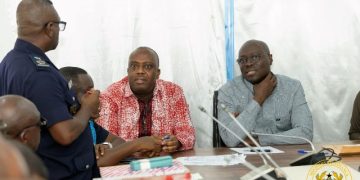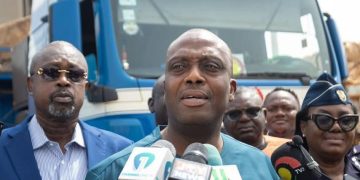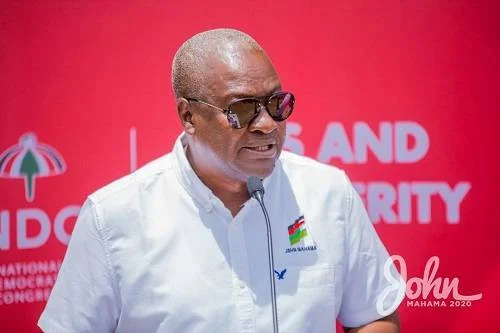Former President John Dramani Mahama, the flag bearer of the National Democratic Congress (NDC), has presented a detailed roadmap for attracting Foreign Direct Investment (FDI) as a crucial element of Ghana’s economic recovery and growth. Speaking at a recent event, Mahama outlined the party’s focused strategies and policies for boosting FDI, which he sees as essential to revitalizing the nation’s economy and addressing current economic challenges.
The former president’s speech, delivered shortly after the launch of the NDC’s 2024 manifesto, emphasized the importance of FDI in driving economic growth, particularly in developing economies like Ghana. Mahama noted that the United States, which attracted $333 billion in FDI in 2023, exemplifies how such investments can fuel economic expansion, citing that the American economy is the world’s largest at $27.4 trillion.
“For developing countries, FDI is even more critical,” Mahama said, highlighting its role in capital accumulation, job creation, and technology transfer. He stressed that FDI also facilitates knowledge exchange, the growth of local SMEs, and the introduction of global best practices in business management.
Limited FDI Inflows: A Challenge for Ghana
Despite FDI’s recognized benefits, Mahama pointed out that Africa, and Ghana in particular, have historically received limited FDI inflows. In 2023, Africa attracted only $53 billion out of the global total of $1.4 trillion, with no African country ranking among the top 20 FDI destinations. By contrast, ‘Developing Asia’ received $621 billion, underscoring the gap Ghana faces in attracting foreign investments.
Mahama attributed Ghana’s low FDI inflows to several domestic challenges, including the proliferation of ill-coordinated regulations, conflicting mandates of state agencies, and violations of contract sanctity. He also cited macroeconomic instability, such as high inflation and an unstable cedi, which hinder businesses’ ability to plan effectively.
“The issue of FDI for Ghana is even more crucial now than ever,” Mahama emphasized, referencing Ghana’s recent default on international debt and its temporary exclusion from the global capital market. He underscored the need for strategic interventions to boost FDI inflows, which will be vital for the country’s economic recovery over the next four years.
Key Challenges Identified
Mahama outlined several factors identified by key players in Ghana’s FDI space that have deterred investment:
- Ill-conceived Regulations: The existence of poorly coordinated laws and policies that create uncertainty for investors.
- Conflicting Mandates: State regulatory agencies often have overlapping or conflicting responsibilities, leading to inefficiencies.
- Contract Sanctity: Investors have faced challenges with the government’s failure to honor contracts, leading to protracted and inefficient dispute resolution.
- Macroeconomic Instability: High inflation and currency instability make it difficult for businesses to plan long-term investments.
- High Cost of Credit: Even well-capitalized foreign firms struggle to access affordable working or investment capital.
- Corruption: Unreasonable demands from some government officials create additional barriers for investors.
- Inconsistent Interpretation of Laws: Variability in how taxation and local content policies are applied adds to the uncertainty.
Proposed Strategic Interventions
To address these challenges, Mahama laid out a series of targeted policy interventions that the next NDC government would implement to create a more favorable investment climate:
- Revocation of Nuisance Taxes: The immediate removal of the COVID levy and e-levy, along with a review of tax rates to make them globally competitive.
- Respect for Contract Sanctity: A firm commitment to honoring properly executed contracts, ensuring investor confidence.
- Efficiency in Government Spending: Reducing waste and corruption, particularly within strategic state-owned enterprises such as the Electricity Company of Ghana and the Ghana Water Company.
- Economic Stabilization: Efforts to stabilize prices and the exchange rate to facilitate better business planning and management.
- Reforms in the Financial Sector: A focus on reducing the cost of credit and implementing broader financial sector reforms.
- Public Sector Reforms: Enhancing the efficiency of government services to businesses through institutional reforms and the effective use of technology.
- Establishment of a Multi-Sector Council: A council chaired by the president will focus on accelerated investment and export promotion, particularly in the context of the 24-hour economy initiative.
Targeted Areas for FDI Attraction
Mahama identified several priority sectors where the NDC government would focus on attracting FDI:
- Extractive Industries: Including newly discovered lithium and graphite minerals, alongside established mining, oil, and gas sectors.
- Digital Economy: Reinvigorating Ghana’s position as a technology hub in West Africa, with plans to attract tech companies back to the country.
- 24-Hour Economy: Seeking FDI participation in a broad range of sectors, including construction, financial services, agro-processing, pharmaceuticals, health services, sanitation, and waste management.
- Big Push Infrastructure Program: A $10 billion infrastructure development initiative through Public-Private Partnerships (PPP).
- Export Ghana Policy: Strengthening the Ghana Free Zones Authority and the Ghana Export Authority to attract investment into export trade, particularly leveraging opportunities under the Africa Continental Free Trade Agreement (AfCFTA).
Institutional Reforms and Investor Incentives
To ensure the successful implementation of these strategies, Mahama emphasized the need for comprehensive institutional reforms. He pledged to continue reviewing the Ghana Investment Promotion Centre (GIPC) Act and other sector-specific laws to streamline processes and eliminate undue burdens on businesses. A team would also be established to review local content laws to ensure they are mutually beneficial for foreign investors and Ghanaian entrepreneurs.
Mahama also proposed the decentralization of investment and business support services by strengthening business advisory centers in all 261 district assemblies, aiming to bring equity to Ghana’s economic growth and development. Furthermore, he advocated for the establishment of a district Quarterly Business Climate Survey to provide real-time data to guide government policies.
Commercial Diplomacy and Investor Protection
Highlighting the importance of commercial diplomacy, Mahama pledged to personally lead efforts to protect investors in Ghana. He expressed a firm commitment to making Ghana “open for business” once again, ensuring that the rule of law is upheld, administrative and regulatory processes are simplified, and transparency is promoted.
Conclusion
In closing, Mahama reiterated his dedication to creating a friendly investment climate in Ghana through strategic reforms, targeted interventions, and active engagement with the business community. He emphasized that the NDC’s plan for boosting FDI is not just about economic growth but about ensuring that every investor in Ghana can operate in a secure, stable, and predictable environment.
With these comprehensive strategies, Mahama and the NDC aim to position Ghana as a leading destination for FDI in Africa, driving sustainable economic growth and development in the years ahead.
Source: www.kumasimail.com

































































